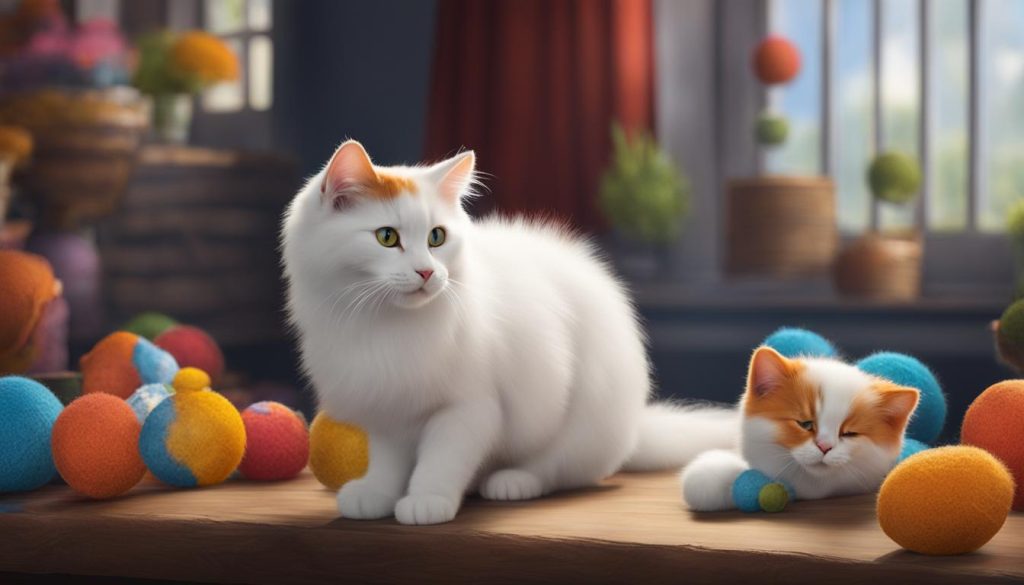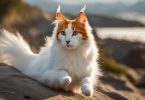Welcome to your comprehensive guide on unlocking the secrets of Turkish Van lifespan. As a cat enthusiast, I have always been fascinated by these unique and beautiful creatures. Turkish Vans, with their stunning white coats and striking color patches, captivate both the eyes and hearts of cat lovers around the world. In this guide, we will delve into the factors that contribute to the longevity of Turkish Vans, from their genetic makeup to their environment and care. So, let’s embark on this journey together and discover how to ensure your Turkish Van leads a long and happy life.
Key Takeaways:
- Turkish Vans have an average lifespan of 12-17 years, and some can live up to 20 years or more.
- Genetic factors play a significant role in determining the longevity of Turkish Vans.
- A healthy and stimulating environment, along with proper care and nutrition, can contribute to their extended lifespan.
- Turkish Vans require a well-balanced diet rich in protein, essential fatty acids, vitamins, and minerals.
- Regular exercise and mental stimulation are crucial for keeping Turkish Vans physically fit and mentally sharp.
Understanding the Turkish Van Breed
The Turkish Van breed is unique and fascinating, known for its stunning appearance and robust health. These cats have a distinct genetic makeup that contributes to their longevity, making them a sought-after breed for cat enthusiasts. Understanding the characteristics and traits of the Turkish Van can shed light on their extended lifespan.
1. Appearance: Turkish Vans have a striking coat pattern, with a predominantly white fur and distinct colored patches on their head and tail. This distinctive appearance sets them apart from other breeds and adds to their allure.
2. Genetic Resilience: The Turkish Van breed is genetically predisposed to good health, which contributes to their extended lifespan. Their unique set of genes promotes a strong immune system, healthy organs, and overall longevity.
“The Turkish Van breed’s genetic makeup plays a significant role in their extended lifespan. Their robust health and resilience make them a popular choice for cat lovers.”
Understanding the Turkish Van Breed
| Characteristics | Description |
|---|---|
| Coat | Predominantly white with colored patches on the head and tail |
| Genetic Resilience | Unique genes contribute to a strong immune system and healthy organs |
| Appearance | Distinctive coat pattern sets them apart from other breeds |
The Turkish Van breed’s genetics make them more resistant to common feline health issues, allowing them to thrive and live longer lives. This resilience is a testament to the breed’s exceptional characteristics and makes them a beloved choice for cat owners.
In the next section, we’ll explore how genetic factors further contribute to the Turkish Van’s extended lifespan, providing insights into the secrets behind their remarkable longevity.
Genetic Factors and Longevity
When it comes to the average lifespan of Turkish Vans, genetic factors play a significant role. These unique cats have a set of genes that contribute to their overall longevity and well-being. The Turkish Van breed is known for its robust constitution and good health, often living longer compared to other cat breeds.
One of the key genetic factors that contribute to the extended lifespan of Turkish Vans is their strong immune system. This allows them to fend off diseases and infections more effectively, leading to a healthier and longer life. Additionally, their genes contribute to the healthy functioning of their organs, reducing the risk of organ-related issues as they age.
Studies have shown that Turkish Vans have a longer average lifespan, with some individuals living well into their late teens or even early twenties. This is largely due to their unique genetic makeup, which ensures their overall vitality and longevity.
The Genetic Factors and Longevity of Turkish Vans
In summary, the genetic factors present in Turkish Vans contribute significantly to their extended lifespan. Their strong immune system, healthy organs, and overall robust constitution allow them to thrive and live longer lives compared to other cat breeds. Understanding these genetic factors is essential for providing the best care and ensuring the well-being of Turkish Vans throughout their lives.
With proper care, nutrition, and a nurturing environment, Turkish Vans can lead long and fulfilling lives. In the next section, we will explore how the environment and care provided to these cats can further enhance their longevity.
Turkish Van Cat Lifespan: Creating a Long and Healthy Life
When it comes to the lifespan of your Turkish Van cat, there are several factors to consider. Providing a nurturing environment and proper care can greatly contribute to their longevity and overall well-being. Let’s delve into the essential aspects of creating a long and healthy life for your Turkish Van.
Environmental Factors and Care
The environment in which your Turkish Van cat lives plays a crucial role in their lifespan. These cats thrive in a healthy and stimulating environment. Ensure they have plenty of space to roam and explore, as well as access to interactive toys that engage their natural instincts. Additionally, it’s important to provide regular veterinary check-ups and preventive care to detect and address any potential health issues early on.
Diet and Nutrition
The diet and nutrition you provide for your Turkish Van cat are essential for their longevity. A well-balanced diet rich in high-quality protein, essential fatty acids, vitamins, and minerals is key to their overall health. Consult with your veterinarian to ensure you’re meeting their specific nutritional needs. Always provide fresh water and avoid overfeeding to prevent obesity, which can negatively impact their lifespan.
Exercise and Mental Stimulation
Regular exercise and mental stimulation are vital for the well-being of your Turkish Van cat. Engage them in interactive play sessions, provide scratching posts, climbing trees, and puzzle toys to keep them physically and mentally active. This helps prevent obesity, promotes healthy muscle development, and keeps their minds sharp, contributing to a longer and happier life.
Socialization and Bonding
Turkish Vans are social cats that form strong bonds with their owners. Spending quality time with them, engaging in interactive play, and creating a loving and nurturing relationship can greatly impact their happiness and overall well-being. Socialization and bonding provide mental and emotional stimulation, leading to a longer lifespan and a fulfilled feline companion.
By considering these factors and implementing proper care, nutrition, exercise, and socialization, you can help ensure a long and healthy life for your Turkish Van cat. Remember, each cat is unique, so consult with your veterinarian for personalized recommendations. Together, you can create a loving and nurturing environment that promotes longevity and happiness for your feline friend.
Diet and Nutrition
Proper nutrition is vital for maintaining the health and longevity of a Turkish Van cat. Feeding them a well-balanced diet that meets their nutritional needs is essential. A diet rich in high-quality protein, essential fatty acids, vitamins, and minerals can help support their overall health and well-being.
When selecting cat food for a Turkish Van, it’s important to choose a brand that provides complete and balanced nutrition. Look for cat food that specifically mentions being formulated for the nutritional needs of adult cats. It is also recommended to consult with a veterinarian to determine the appropriate portion sizes and feeding schedule for your Turkish Van.
| Benefits of a Balanced Diet | Food to Avoid |
|---|---|
|
|
In addition to a balanced diet, it is crucial to provide fresh water at all times. Hydration is essential for a Turkish Van’s overall health and helps support proper organ function. Make sure to clean and refill their water bowl regularly to ensure it is clean and free from contaminants.
Note that individual cats may have specific dietary requirements or food allergies. It’s important to monitor your Turkish Van’s response to different foods and consult with a veterinarian if you notice any digestive issues or allergic reactions.
Turkish Van Lifespan: The Importance of Veterinary Care and Health Monitoring
When it comes to the lifespan of Turkish Vans, proper veterinary care and health monitoring are key factors that contribute to their longevity. Regular check-ups and preventive care play a crucial role in ensuring the overall well-being of these unique cat breeds. By addressing any potential health issues early on, we can significantly extend their lifespan and improve their quality of life.
Veterinary care for Turkish Vans should include routine check-ups, vaccinations, and preventive care measures such as flea and tick control. These regular visits to the veterinarian allow for early detection of any underlying health problems, providing the opportunity for prompt treatment and intervention. It’s important to establish a strong relationship with a trusted veterinarian who understands the specific needs of Turkish Vans and can provide the best care possible.
Additionally, health monitoring at home is equally important for maintaining the well-being of Turkish Vans. Observing their behavior, appetite, and litter box habits can provide valuable insights into their overall health. Any changes in these patterns should be monitored closely and reported to the veterinarian. Early detection of health issues can greatly improve the chances of successful treatment and a longer, healthier life for these beloved pets.
| Benefits of Veterinary Care and Health Monitoring for Turkish Vans |
|---|
| Early detection of health issues |
| Prompt treatment and intervention |
| Improved quality of life |
| Extended lifespan |
“Regular veterinary care and health monitoring are crucial for Turkish Vans to live long, healthy lives,” says Dr. Emily Johnson, a renowned feline veterinarian.
By addressing any potential health issues early on, we can provide the best chances for these cats to thrive and enjoy a longer lifespan.”
In conclusion, Turkish Vans can enjoy a longer lifespan when provided with regular veterinary care and health monitoring. By being proactive in their healthcare, we can ensure that these unique and beautiful cats live the happiest, healthiest lives possible.
Managing Stress and Anxiety
When it comes to promoting the longevity of Turkish Van cats, managing stress and anxiety is crucial. These cats are known for their sensitive nature, and excessive stress can have a negative impact on their overall well-being and lifespan. As a responsible owner, it’s important to create a calm and stress-free environment for your Turkish Van.
Minimizing environmental stressors is key. Avoid sudden changes in routine and loud noises that can startle or distress your cat. Providing them with safe spaces and plenty of opportunities for relaxation, such as cozy hiding spots and comfortable bedding, can help alleviate anxiety and promote a longer lifespan.
Additionally, engaging in calming activities such as gentle petting, soothing music, or using pheromone diffusers can help create a sense of security for your Turkish Van. These measures can go a long way in providing them with a stress-free environment and contribute to their longevity.
Quotes
“Creating a calm and stress-free environment for your Turkish Van is crucial for their overall well-being and longevity.”
Tips for Managing Stress and Anxiety in Turkish Van Cats
- Minimize sudden changes in routine and loud noises.
- Provide safe spaces and cozy hiding spots.
- Engage in calming activities like gentle petting and soothing music.
- Consider using pheromone diffusers to create a sense of security.
Conclusion
By carefully managing stress and anxiety in Turkish Van cats, owners can contribute to their overall well-being and promote a longer lifespan. Creating a calm and stress-free environment, minimizing stressors, and providing relaxation opportunities are essential steps in ensuring the happiness and longevity of these unique feline companions.
Turkish Van Breed Lifespan: The Importance of Socialization and Bonding
When it comes to increasing the lifespan of your Turkish Van, socialization and bonding are two key factors to consider. These cats are known for their social nature and strong bonds with their owners. By providing them with plenty of opportunities for socialization and creating a loving and nurturing relationship, you can greatly impact their overall well-being and longevity.
Spending quality time with your Turkish Van is essential. Engage in interactive play, such as chasing toys or feather wands, to keep them mentally stimulated and physically active. Not only does this help prevent obesity and other health issues, but it also promotes a strong bond between you and your feline companion.
Creating a calm and stress-free environment is also important for your Turkish Van’s longevity. Minimize environmental stressors, such as loud noises or sudden changes in routine, to reduce stress and anxiety. Establishing safe spaces where your cat can retreat to, such as a cozy cat bed or a dedicated hiding spot, can provide comfort and help alleviate any anxiety they may experience.
Remember, Turkish Vans thrive on social interaction and affection. Make it a point to shower them with love, attention, and gentle petting. This will not only strengthen your bond but also contribute to their overall happiness and well-being. By prioritizing socialization and bonding, you can ensure that your Turkish Van enjoys a long and fulfilling life.
The Benefits of Socialization and Bonding
- Enhanced mental and emotional well-being
- Reduced stress and anxiety
- Increased physical activity and exercise
- Stronger bond with your feline companion
- Improved overall happiness and quality of life
Remember, a happy and well-socialized Turkish Van is more likely to lead a longer and healthier life. By providing them with the love, attention, and social interactions they need, you can help ensure that they thrive and enjoy many years of companionship.
| Factors | Benefits |
|---|---|
| Regular interactive play | Promotes physical exercise and mental stimulation |
| Creating a calm and stress-free environment | Reduces risk of stress-related health issues |
| Establishing safe spaces | Provides a sense of security and comfort |
| Showering them with love and attention | Strengthens the bond between owner and cat |
Conclusion
In conclusion, Turkish Vans are a remarkable cat breed renowned for their longer-than-average lifespan. Their unique genetic makeup and predisposition to good health contribute to their extended years of companionship. By understanding and implementing proper care practices, owners can ensure that their Turkish Vans live long and fulfilling lives.
Creating a healthy and stimulating environment is essential for Turkish Vans’ longevity. Regular veterinary check-ups, a well-balanced diet, and opportunities for exercise and mental stimulation are crucial factors in maintaining their overall well-being. Taking proactive measures to manage stress and anxiety, as well as fostering socialization and bonding, further promotes their longevity.
With an average lifespan ranging from 12 to 17 years and some individuals living even longer, Turkish Vans bring joy to their owners for many years. By providing the right care, love, and attention, you can ensure that your Turkish Van companion leads a happy, healthy, and extended life.
FAQ
What is the average lifespan of a Turkish Van?
The average lifespan of a Turkish Van is around 12-17 years, with some individuals living up to 20 years or more.
What factors contribute to the longevity of Turkish Vans?
The genetic predisposition to good health, proper care, nutrition, a nurturing environment, and regular veterinary check-ups all contribute to the longevity of Turkish Vans.
What kind of diet should I provide for a Turkish Van?
Turkish Vans require a well-balanced diet that is rich in protein, essential fatty acids, vitamins, and minerals. Feeding them high-quality cat food that meets their nutritional needs is crucial for their overall health and longevity.
How can I ensure my Turkish Van remains mentally stimulated?
Regular exercise through play and interactive toys is important to keep Turkish Vans physically fit and mentally stimulated. Providing them with environmental enrichment, such as scratching posts, climbing trees, and puzzle toys, can keep their minds sharp and promote longevity.
How often should I take my Turkish Van to the vet?
Regular veterinary care is crucial for monitoring the health of Turkish Vans. Routine check-ups, vaccinations, and preventive care, such as flea and tick control, are essential to ensure their overall well-being and extend their lifespan.
How can I reduce stress and anxiety in my Turkish Van?
Providing a calm and stress-free environment, minimizing environmental stressors, and providing safe spaces and opportunities for relaxation can help reduce stress and promote longevity in Turkish Vans.
Can Turkish Vans form strong bonds with their owners?
Yes, Turkish Vans are social cats that form strong bonds with their owners. Spending quality time with them, engaging in interactive play, and creating a loving and nurturing relationship can contribute to their longevity.









